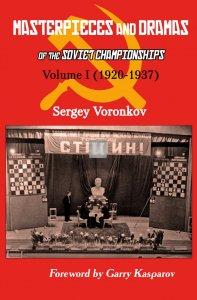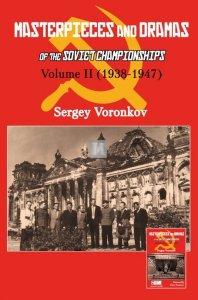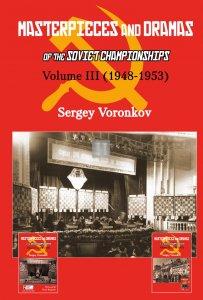Masterpieces and Dramas of the Soviet Championships: Vol 1 + Vol 2 + Vol 3

Serie "Masterpieces and Dramas of the Soviet Championships"
Volume 1 + Volume 2 + Volume 3
Si veda sotto la descrizione dei 3 volumi
Descrizione
Volume I (1920-1937)
Sergey Voronkov was born in 1954 and lives in Moscow. He is a leading Russian chess historian, journalist and author. Sergey has written ten books in Russian and numerous articles on Russian chess history. He graduated in Journalism from Moscow State University and edited over 100 chess books for the Fizkultura i Sport publishing house in 1978-1991. He was Deputy Chief Editor of the magazine Chess in Russia (the successor to Chess in the USSR) in 1992-1999 working under Yuri Averbakh. As an editor of the Ripol Klassik publishing house in 2002-2015 Sergey increased the total number of books edited by him to around 150, including fourteen written by Garry Kasparov (the original versions of the Modern Chess, Garry Kasparov on Garry Kasparov and My Great Predecessors series among others). He regularly contributes articles to the leading Russian-language ChessPro website.
For his first book on David Janowski (1987 in Russian, co-authored with Dmitry Plisetsky) Sergey won the prize for Best Chess Book from the USSR Sports Committee. His other books include David Versus Goliath (2002 in Russian, co-authored with David Bronstein, published in English as Secret Notes, 2007), Russians Versus Fischer (2004 in Russian, co-authored with Dmitry Plisetsky, English editions published in 1994 and 2005, Italian edition published in 2003), Fyodor Bogatyrchuk: the Dr. Zhivago of Soviet Chess (2013 in Russian, in two volumes), Masterpieces and Dramas of the Soviet Championships (2007 and 2019 in Russian, in three volumes) and The Russian Sphynx. Alexander Alekhine (2020 in Russian). Sergey's father Boris Voronkov was a distinguished chess coach of the RSFSR, an International Master at correspondence chess, an author of two chess books, and a participant in the semi-final of the Soviet Championship in 1956.
Volume II (1938-1947)
The second part of Sergey Voronkov’s three-volume treatise continues from where Volume I left off. It covers the eleventh to fifteenth Soviet championships, the 1941 match tournament for the title of Soviet Absolute Champion, and the main events in the country’s chess history between these tournaments. Themes include the downfall of Nikolai Krylenko, the persecution and disappearance of Soviet chess players during the purges, and the experience of chess players in World War Two. The atmosphere of the time is captured in contemporary accounts and memoirs of key players and cultural figures.
We see Botvinnik and Keres established as leading challengers for Alekhine’s throne, with plans being made to arrange a title match. We encounter for the first time and witness the rise of great Soviet players such as Smyslov, Bronstein and Boleslavsky, and enjoy the games of many other stars including Flohr, Lilienthal, Bondarevsky, Kotov and Tolush.
This volume contains 84 games and fragments mostly annotated by the players themselves and their peers, and subjected to recent computer analysis. It is illustrated with around 250 photos and cartoons from the period, the main sources being Russian chess magazines and tournament bulletins.
Volume I of Masterpieces and Dramas of the Soviet Championships was named the English Chess Federation’s Book of the Year 2021. The jury stated: “The book reads like a novel… A most remarkable, absorbing and entertaining chess history which fully lives up to its title, Masterpieces and Dramas, on and off the board. A worthy winner of Book of the Year 2021 over strong competition.”
Volume III (1948-1953)
Sergey Voronkov was born in 1954 and lives in Moscow. He is a leading Russian chess historian, journalist and author. Sergey has written ten books in Russian and numerous articles on Russian chess history. He graduated in Journalism from Moscow State University and edited over 100 chess books for the Fizkultura i Sport publishing house in 1978-1991. He was Deputy Chief Editor of the magazine Chess in Russia (the successor to Chess in the USSR) in 1992-1999 working under Yuri Averbakh. As an editor of the Ripol Klassik publishing house in 2002-2015 Sergey increased the total number of books edited by him to around 150, including fourteen written by Garry Kasparov (the original versions of the Modern Chess, Garry Kasparov on Garry Kasparov and My Great Predecessors series among others). He regularly contributes articles to the leading Russian-language ChessPro website.
The third volume of Sergey Voronkov's epic tale takes the reader on a historical journey through the late Stalinist period in the USSR. It covers in depth the five Soviet championships from 1948 to 1952 and the playoff match between Botvinnik and Taimanov in 1953, which concludes one month before Stalin's death. Against a background of rampant anti-Semitism, a new wave of repressions and descent into the First Cold War, in which chess was an important front, the USSR captures the world chess crown and Botvinnik and the generation that followed him, including Smyslov, Keres, Bronstein, and Boleslavsky, assert their places at the top-tables of Soviet and indeed global chess. Yet a new group of legends begins to emerge, including Petrosian, Geller, Korchnoi, Taimanov, Averbakh, Simagin, Kholmov, and Furman making their championship debuts, as well as a semi-final appearance by Nikitin and Spassky's first quarter-final. At the same time, the reader learns about lesser-known masters Yuri Sakharov and Johannes Weltmander, victims of Stalinism who found solace in chess from their otherwise tragic lives.
The present volume contains 77 games and fragments, once again mostly annotated by the participants and other contemporary masters, augmented with modern computer analysis. It is illustrated with over 220 photos and cartoons from the period. Many of these photos come from unique archives, including that of David Bronstein, and are published for the first time.
Informazioni
- Marca Elk and Ruby
- Codice soviet1,2,3
- Anno 2020, 2021, 2022
- Pagine p.534 + p.524 + p.524
 Italiano
Italiano
 English
English




